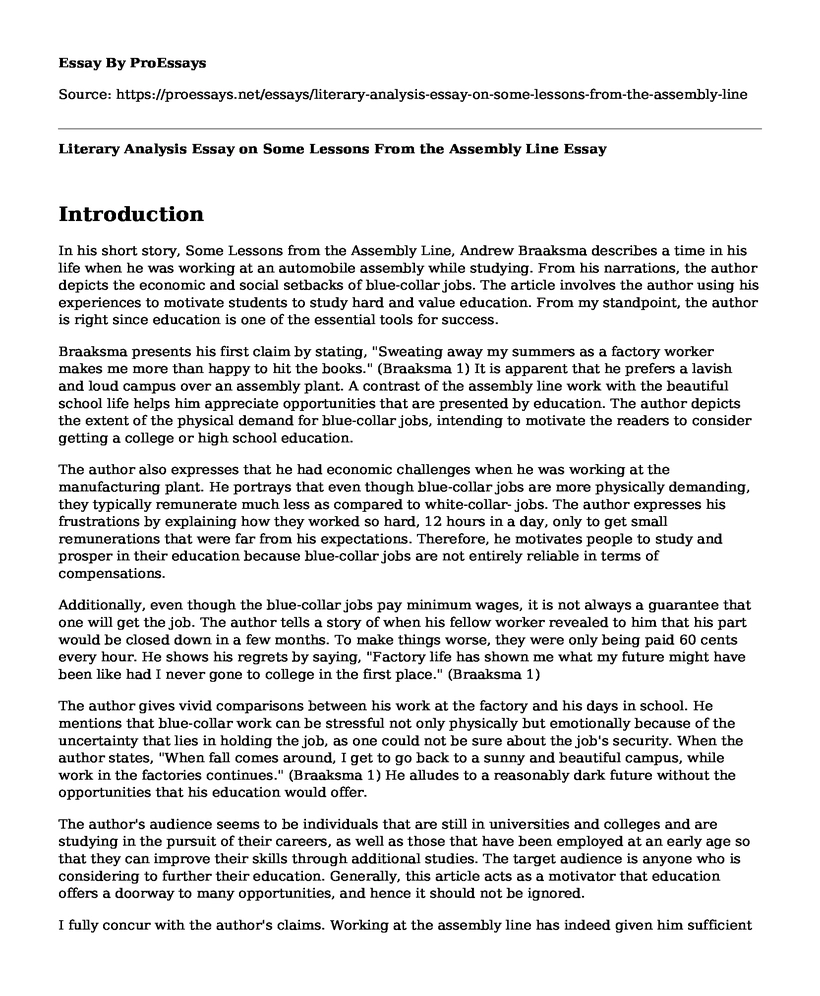Introduction
In his short story, Some Lessons from the Assembly Line, Andrew Braaksma describes a time in his life when he was working at an automobile assembly while studying. From his narrations, the author depicts the economic and social setbacks of blue-collar jobs. The article involves the author using his experiences to motivate students to study hard and value education. From my standpoint, the author is right since education is one of the essential tools for success.
Braaksma presents his first claim by stating, "Sweating away my summers as a factory worker makes me more than happy to hit the books." (Braaksma 1) It is apparent that he prefers a lavish and loud campus over an assembly plant. A contrast of the assembly line work with the beautiful school life helps him appreciate opportunities that are presented by education. The author depicts the extent of the physical demand for blue-collar jobs, intending to motivate the readers to consider getting a college or high school education.
The author also expresses that he had economic challenges when he was working at the manufacturing plant. He portrays that even though blue-collar jobs are more physically demanding, they typically remunerate much less as compared to white-collar- jobs. The author expresses his frustrations by explaining how they worked so hard, 12 hours in a day, only to get small remunerations that were far from his expectations. Therefore, he motivates people to study and prosper in their education because blue-collar jobs are not entirely reliable in terms of compensations.
Additionally, even though the blue-collar jobs pay minimum wages, it is not always a guarantee that one will get the job. The author tells a story of when his fellow worker revealed to him that his part would be closed down in a few months. To make things worse, they were only being paid 60 cents every hour. He shows his regrets by saying, "Factory life has shown me what my future might have been like had I never gone to college in the first place." (Braaksma 1)
The author gives vivid comparisons between his work at the factory and his days in school. He mentions that blue-collar work can be stressful not only physically but emotionally because of the uncertainty that lies in holding the job, as one could not be sure about the job's security. When the author states, "When fall comes around, I get to go back to a sunny and beautiful campus, while work in the factories continues." (Braaksma 1) He alludes to a reasonably dark future without the opportunities that his education would offer.
The author's audience seems to be individuals that are still in universities and colleges and are studying in the pursuit of their careers, as well as those that have been employed at an early age so that they can improve their skills through additional studies. The target audience is anyone who is considering to further their education. Generally, this article acts as a motivator that education offers a doorway to many opportunities, and hence it should not be ignored.
I fully concur with the author's claims. Working at the assembly line has indeed given him sufficient life experience to make those thought processed claims. Working as a blue-collar worker gave the author some lessons that inspired him to do the most out of his campus years and to keep on studying, and this narration has motivated me to do the same.
References
Braaksma, A. Some Lessons from the Assembly Line. Newsweek. 9/12/2005, Vol. 146, Issue 11.
Cite this page
Literary Analysis Essay on Some Lessons From the Assembly Line. (2023, Mar 31). Retrieved from https://proessays.net/essays/literary-analysis-essay-on-some-lessons-from-the-assembly-line
If you are the original author of this essay and no longer wish to have it published on the ProEssays website, please click below to request its removal:
- Critical Essay on Changes in the "Little Sister Born in This Land"
- Character Analysis of The Great Gatsby
- The Parable of the Sower by Octavia Butler Paper Example
- Critical Analysis Essay on Flannery O'Connor's Revelation and John Updike's Pigeon Feathers
- Eileen Chang: Iconic Writer and Hall of Fame Icon - Essay Sample
- Essay Sample on Rufus Weylin: A Crucial Role in Kindred by Octavia Butler
- Brave New World: Individualism vs. Collectivism - Essay Sample







